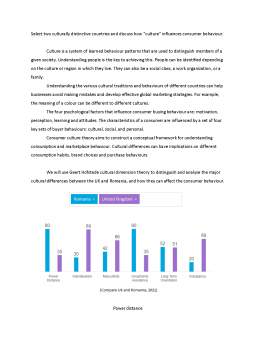Extras din referat
Culture is a system of learned behaviour patterns that are used to distinguish members of a given society. Understanding people is the key to achieving this. People can be identified depending on the culture or region in which they live. They can also be a social class, a work organization, or a family.
Understanding the various cultural traditions and behaviours of different countries can help businesses avoid making mistakes and develop effective global marketing strategies. For example, the meaning of a colour can be different to different cultures.
The four psychological factors that influence consumer buying behaviour are: motivation, perception, learning and attitudes. The characteristics of a consumer are influenced by a set of four key sets of buyer behaviours: cultural, social, and personal.
Consumer culture theory aims to construct a conceptual framework for understanding consumption and marketplace behaviour. Cultural differences can have implications on different consumption habits, brand choices and purchase behaviours.
We will use Geert Hofstede cultural dimension theory to distinguish and analyse the major cultural differences between the UK and Romania, and how they can affect the consumer behaviour.
Power distance
This concept shows that the less powerful members of society accept that power is distributed equally. It suggests that society’s level of inequality is widely endorsed by the followers of the leaders.
Scoring 35, Britain shows a society that believes in the importance of eliminating inequalities.
This dimension (score of 90) shows that people in Romania accept a hierarchy (which is viewed as a reflection of the inherent inequalities within an organization) that gives everyone a place. It also shows that centralization is popular. As an example, they will consider themselves unworthy in front of an expensive/branded product, considering that it is somehow reserved for the higher hierarchical levels.
Individualism/Collectivism
Individualism is the degree to which people are integrated into groups (me). On the other hand, collectivism is the degree to which people are organized into groups (we) that protect their members in exchange for their loyalty.
The UK citizens are taught to think for themselves and how they can contribute to society, with nuclear family as the centre of social structure on macro-economic level. In the UK, the parents advise that education is important to one’s success.
As an example, British people were genuinely curious about Orthodox Easter and wanted to know all about traditions in celebrating it. With that information, they created the opportunity for the consumers to find Easter-related products still available in the stores long after the British Easter.
Romania is a collectivistic society. This means that loyalty is supreme, and everyone in the group takes responsibility for their actions. This culture values family and employer/employee relationships. In Romania, the parents advise that education is important in regards with giving back to the family. As example, celebrating Valentine’s Day and Halloween are being seen as a way of submission to the control imposed by different cultures, and the ones that are celebrating are looked at with disgust by the elderly.
Bibliografie
Arnould, E. and Thompson, C., 2005. Consumer Culture Theory (CCT): Twenty Years of Research. Journal of Consumer Research, 31(4), pp.868-882.
Belk, R., 2013. Extended Self in a Digital World: Table 1. Journal of Consumer Research, 40(3), pp.477-500.
Hofstede, G., 1994. The business of international business is culture. International Business Review, 3(1), pp.1-14.
KOTLER, P., ARMSTRONG, G., HARRIS, L. C., & HE, H. (2020). Principles of marketing.
Steenkamp, J., 2019. Global Versus Local Consumer Culture: Theory, Measurement, and Future Research Directions. Journal of International Marketing, 27(1), pp.1-19.
2021. Compare UK and Romania. [image] Available at: <https://www.hofstede-insights.com/product/compare-countries/> [Accessed 2 June 2021].
Preview document
Conținut arhivă zip
- Select two culturally distinctive countries and discuss how culture influences consumer behaviour - UK and Romania.docx








